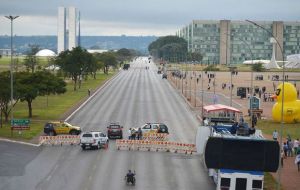MercoPress. South Atlantic News Agency
Brazil kept running through general strike and political crisis
 In Brasilia there were no bus or underground services available but it was business almost as usual in the rest of the country.
In Brasilia there were no bus or underground services available but it was business almost as usual in the rest of the country. Brazil went through Friday's general strike, the second of its kind called for by labour unions against the economic reforms President Michel Temer intends to bring about, with business nearly unaffected in major cities, Brasilia excluded. Temer's personal involvement in alleged cases of corruption seemed to have had little or no impact on the workers' decision.
Without support from the transport unions in Sao Paulo, the country's most populous and industrialized state, and Rio de Janeiro, the strike failed to achieve its goals.
Neither the political earthquake unleashed since last May, nor the controversial economic reforms undertaken by the Executive managed to bring the country to a complete stop.
The previous general strike since Temer took office was on April 28.
However, the strike did hit some targets in Brasilia, where the protest was felt with greater intensity, as there were no bus or underground services available.
In the morning, groups of strikers blocked access to some of the country's major cities with barricades that they set ablaze.
Later, there were mobilizations in the country's 27 states to protest, in a peaceful way, against the liberal-led reform package of reforms which includes tough fiscal adjustments and changes to labour laws particularly regarding wage bargaining, and pensions.
In Sao Paulo, protesters burned a giant duck on Avenida Paulista in the financial heart of the city, which has become the symbol of the highly-influential Federation of Industries of the State of Sao Paulo (Fiesp).
The reform package, praised by employers and strongly criticised by unions, has been put on stand-by in Congress since the scandal that threatens Temer's continuity in power of Temer.
The president, who has reiterated that he will exercise his mandate to its last day on January 1, 2019, is also under investigation for the crimes of obstruction of justice and illicit association, which could lead to new lawsuits against him.
The suspicions about Temer are based on the revelations to Justice of several executives of the group JBS, who have pointed fingers at him saying he has accepted bribes since 2010 and they submitted audio recordings which seem to back those allegations.
Since the outbreak of the scandal, uncovered last May 17, the president has lost the support of several minority parties with parliamentary representation and even the opposition and some lawmakers of his own party have asked for his immediate resignation and hampered the process of the aforementioned reforms .
The labour reform is a step closer to entering into force and only needs to be approved by the Senate before being sanctioned by the president, while that of the pension system is paralyzed in the House of Deputies, which must also decide on whether to move forward with Temer's impeachment, for which two-thirds of the are required.
Should the charges be pushed forward, the matter would be sent to the Supreme Court and if the judiciary too finds it appropriate to proceed, Temer would be suspended from office for 180 days.




Top Comments
Disclaimer & comment rules-

Read all commentsWhile the corrupt keep fooling around: https://www.bloomberg.com/news/articles/2017-04-18/lies-videotapes-and-recession-dash-recovery-hopes-in-brazil
Jul 01st, 2017 - 11:03 am 0Commenting for this story is now closed.
If you have a Facebook account, become a fan and comment on our Facebook Page!